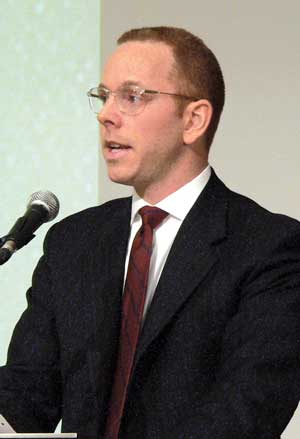The intelligence method, rather than a criminal prosecution, could be a better model to apply when it comes to combating radicalization, says the director of intelligence analysis for the New York City Police Department.

Speaking at the recent 2007 Raoul Wallenberg International Human Rights Symposium held at Osgoode Hall Law School, Samuel Rascoff said perhaps prosecution is not the best option for dealing with radicalization and terrorism.
"The prosecutorial paradigm, again by which I mean to evoke the familiar process that begins with the alleged commission of a crime, evolves into a case or investigation, proceeds to a formal charge and an arrest and culminates - at least the prosecutors hope culminates - in a trial by jury conviction and imprisonment, all the while being subject to varying degrees of public scrutiny, is the wrong model to apply to counter the threat posed by radicalization," said Rascoff.
He said with over 500 individuals tried in U.S. Federal Court for terrorism-related charges after Sept. 11, 2001, there were only 45 convictions - a serious mismatch, he notes, resulting from the use of the ordinary criminal justice system as the tool to deal with radicals.
He said criminal law and the prosecutorial paradigm cannot "encompass activity which may carry significant implications for public safety, but may not in itself be criminal."
"The intelligence paradigm is focused not on arrest, trial and incarceration, but on situational awareness, prevention, and where necessary, interdiction and disruption," he said. He argued that intelligence, rather than focusing on one case at a time, is capable of understanding radicalization within a complex social environment.
"To the law enforcement investigator, or to the prosecutor, criminal cases are made by connecting individual dots. To the analysts, intelligence comes from making sense of the entire canvas," he explained.
Rascoff noted that his opinions were his own and not those of the NYPD, and that he was also not taking a position on whether the United States should have a dedicated domestic intelligence service similar to the British MI5.
He argued that intelligence is also more protective of basic constitutional rights. "Most basically, the constitutional stakes at issue in the intelligence paradigm are lower than those at issue in a criminal prosecution," he noted.
"I do not mean to deny, of course, that other rights, principally privacy and expressive rights are critically important, therefore that the intelligence paradigm requires robust judicial oversight," he added.
"The contextually rich information learned through the intelligence paradigm when shared with legislators, policy makers, and with judges, positions them to strike the appropriate balances between liberty and freedom on an ongoing basis.
"For those of us who recognize that balances between rights and security must be struck, the prospect of doing so with the most sophisticated information and analysis must be welcomed," he said.
While Rascoff feels criminal prosecutions are not the way to go, there are a number of them under way around the world and the issue of using evidence acquired by torture, and its validity in legal proceedings, is being dealt with by the courts, said David Luban, the Frederick J. Hass professor of law and philosophy at Georgetown University in Washington, D.C.
He noted that the British House of Lords ruled in December 2005 that evidence obtained through torture was inadmissible, because it is inherently unreliable and because refusing to admit tortured evidence removes an incentive for torturers.
He said there is currently a motion in the United States Senate to repeal some sections of the Military Commissions Act, which came into force last fall after the U.S. Supreme Court decision in
Hamdan v. Rumsfeld, which affirmed art. 3 of the Geneva Convention, protecting detainees from torture.
"The Military Commissions Act flat-out forbids the admittance of evidence obtained by torture," noted Luban.
However, he said, under the act, a prosecutor may introduce evidence and protect the methods by which the evidence was acquired, if a military judge deems the methods to be classified.
"It is very important for democracy, human rights, and civil liberties that we know what our governments are doing," said Philip Heymann, the James Barr Ames professor of law at Harvard Law School.
The public and the courts can go a long way with what information the government should have to disclose without compromising security, he said.
With respect to the counter-terrorism techniques being used, Heymann said that there are three key questions: Do we need information about our counter-terrorism techniques, when and why might the unwillingness to release this information be justified, and how can the public and the courts take part in judging when this information should be disclosed?
"It's very important for democratic responsibility and for human rights and for civil liberties that someone besides the executive know what we're doing," he said.

 Speaking at the recent 2007 Raoul Wallenberg International Human Rights Symposium held at Osgoode Hall Law School, Samuel Rascoff said perhaps prosecution is not the best option for dealing with radicalization and terrorism.
Speaking at the recent 2007 Raoul Wallenberg International Human Rights Symposium held at Osgoode Hall Law School, Samuel Rascoff said perhaps prosecution is not the best option for dealing with radicalization and terrorism.